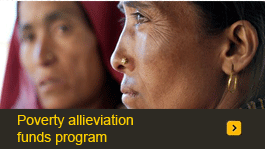About RSN
Nepal’s manifold heritages like the nice people, Lord Buddha, Himalayas and abounding resources are far from enriching the majority of people. Ironically, most of the people live with less than one US$ daily and the status of women, children and ethnic people is more severe. The Millennium Development Goals (MDG) and the Government’s Poverty Reduction Strategy Paper (PRSP) call for an active role of the civil society to improve this situation. In this process, a team of multidisciplinary experts founded the Renaissance Society Nepal (RSN) in 1994 as a non-governmental organization (NGO). [See Organogram of RSN]
RSN has addressed the issues of deprived communities, gender empowerment, regional disparities, and equitable distribution of resources, conflict management and peace building. It also raised the livelihood status of over 55,000 disadvantaged people like women, children and ethnic communities in remote areas, and has empowered them to build institutions.
Vision
RSN envisions a Nepalese society where all people enjoy opportunities for their progress with justice, equality, peace and prosperity. Appropriate institutions would be in place to create a prosperous, just and forward looking society
Mission
RSN mission is to develop the entrepreneurship and self-governing institutions for improving the lives of the rural poor, particularly women, small farmers, oppressed communities and ethnic minorities, and bring about their socio-economic empowerment.
Aims
RSN aims to empower the people so that they can attain self-reliance and confidence for long-term sustainable development. It strives to release the people’s boundless potentials for enhancing their productive and organizing abilities for their own development. RSN initiates the activities to empower peoples’ organizations as core activity, which is integrated and community based.
Objectives
- Conceptualize, develop, execute and evaluate income generating livelihood programmes.
- Create awareness in the diverse sectors such as education, environment, human rights, self-governance, resource mobilization, micro-finance, gender parity, and health issues with special focus to the HIV/ AIDS and mother-child health.
- Implement the development projects on sustainable agriculture, food security, community based social and agro-forestry, livestock production, safe drinking water, renewable energy, irrigation, institutional development, entrepreneurship and rural infrastructures.
- Work with the local people to evolve new organizations and strengthen the existing ones so that the self-organization, self-governance and self-reliance are promoted.
- Promote the indigenous knowledge, skills and resources to strengthen the process of self-development, conservation of natural resources, environment and bio-diversity.
- Advocate lobby and form networks at the local, national and international levels for the great cause of people.
- Conduct the training, workshops, seminars and develop the human resources.
- Carry out the action-research on socio-economic conditions and other aspects of community.
- Carry out the evaluation/ studies of development projects, programmes, models and approaches.
- Disseminate the issue-based information pertaining to contemporary national concerns, sustainable development, democracy, human rights, gender, bonded labour, health effects and impacts of agro-chemicals. And Publish the people-oriented, IEC-materials (information, education and communication) and periodic bulletins for mass education



